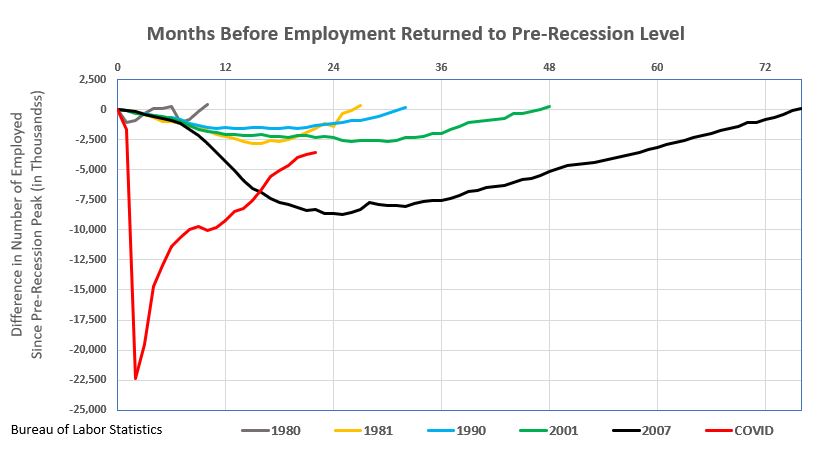Anemic Post-Recession Job Recovery
The year 2021 ended with a December gain of 199,000 jobs, slightly above the monthly average for the 2011-2020 decade. But after losing over 22 million jobs at the start of the pandemic, the December gain was half the total economists had projected, and the lowest monthly gain since the start of the Covid-19 recession 22 months earlier. The December gain leaves the economy over 3.5 million jobs below when the recession began in February 2020. As the graph below shows, the loss of jobs in the recession far exceeded that of any recession since 1980, and after 22 months, recovery is behind all those previous recoveries except the Great Recession in 2007.
(Click to enlarge graph)
Job recovery is facing multiple headwinds. Millions of workers retired during the Covid Recession; in addition to the normal aging of Baby Boomers, over three million workers took retirement earlier than they might have done absent the pandemic. In addition to retirement, the so-called “Great Resignation” saw as many as 4.5 million workers leaving their jobs in a single month. The nearly 900,000 deaths due to Covid-19 included over 200,000 working-age people 18-64 years old. A University of California, Davis article [LINK 2] estimates that during 2020 and 2021 about two million fewer working-age immigrants entered the U.S., half of whom would have been college-educated. And while jobs have been lost to technology for decades, the shortage of workers during the pandemic led to greater use of telemedicine for the overstretched healthcare industry, and increased automation in food service and hotels.
Against so many adverse trends, restoring employment to its pre-pandemic level is like running up a down escalator. The metaphor is apt for much that is happening in the United States overall. Recovery from Covid-19 is thwarted by opposition to accepted health practices. Stimulus payments that eased families through unpaid months of lockdowns left a spike in inflation for the Federal Reserve Bank to manage. Political polarization has prevented progress on a number of issues including election reform, immigration, clean energy, universal pre-k education, and healthcare affordability.
Restoration of the remaining 3.5 million jobs would benefit greatly from wide acceptance of healthcare professionals’ recommendations. Passage of proposals tackling infrastructure needs would directly add new jobs. The very measures that would put the economy back on its pre-pandemic course are victims of anti-government activism preventing those measures. There couldn’t have been a worse time for loss of trust in government than during a pandemic.

